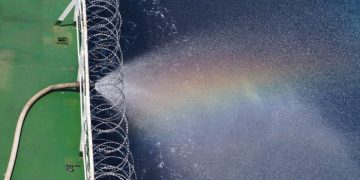New cooperation for the supply of fuel from offshore barges
 The International Bunker Industry Association (IBIA) has announced that it will be working with the South African Maritime Safety Authority (SAMSA) to develop a Bunkering Code of Practice for the supply of fuel from offshore barges.
The International Bunker Industry Association (IBIA) has announced that it will be working with the South African Maritime Safety Authority (SAMSA) to develop a Bunkering Code of Practice for the supply of fuel from offshore barges.
Offshore bunkering is currently banned in South Africa, but SAMSA is taking steps to open the market to offshore providers. SAMSA has granted provisional permission to Aegean Marine Petroleum Network Inc to deliver intermediate fuel oil (IFO) in Algoa Bay OPL area. The agreement is subject to Aegean Marine meeting the terms of Act 6 Section 21 (1) (b) of the Marine Pollution (Control and Civil Liability Act 1981).
The particular proposal specifically relates to ship to ship transfer procedures using a double hulled storage tanker and smaller double hulled tankers to affect safe bunker fuel transfer to passing vessels. The vessels are expected to be operational in the spring of 2014.
IBIA will be consulting local industry and other stakeholder groups to develop a code of practice using lessons learnt from the ports of Gibraltar and Singapore, both major bunkering hubs. IBIA has already supported Gibraltar’s growth by its personnel developing a Bunkering Code of Practice for the port.
IBIA Chief Executive Peter Hall said:
“An IBIA working group will work hand in hand with SAMSA to produce a Code of Practice which will help South Africa develop a safe and commercially viable set of standards based on global best practice. We call on all interested parties, including refiners and shipowners to engage with the working group.”
South Africa has seen its share of the vessel refuelling market decline in recent years. Last year around 600 ships a day moved around South Africa, whilst the volume of bunkers sold in Durban hit a twenty year low with 1.1m tonnes traded in 2012. 2013 sales volumes look set to decline further as the area struggles with current market forces.
The IBIA Chief Executive noted:
“The country is strategically very well located to handle vessels servicing the predicted increase in South American to Asia dry bulk trades as well as Asia to South America container traffic. Increased bunkering would mean increased business for port operations firms, oil producers, barging companies as well as international bunker trading companies.”
Source: IBIA



























































